COVID-19 Response: Panel of CEOs Explain What’s Changed for Good
 Mark Smith, Owner, Midas of Richmond
Mark Smith, Owner, Midas of Richmond
“It could’ve been very easy to say, ‘Hunker down, cover yourself, and let’s survive this,’” says Mark Smith of Midas of Richmond when asked about his business mindset at the beginning of the COVID-19 crisis. “I just chose to take the opposite route.”
“I just went in as upbeat. It’s a positive. ‘Yeah, this is not ideal, but there are going to be things that are going to capture market share. It’s an unfortunate way to look at this, but there are going to be people who survive this and there are going to be some who won’t. We’re going to turn it up even harder.’”
So Mark Smith bet big.
“We’ve always gone in kind of expecting success. Well, now we expect success just a little bit more.” – Mark Smith, Midas of Richmond
Smith ramped up his monthly marketing budget by more than 35%, added another TV station to his broadcast media strategy, doubled his radio spots, and hired Red Orange Studios, a Richmond, VA ad agency, to build a robust “More to Your Door” campaign – one he intends to invest in significantly.
“So the big thing that changed for me was my mindset,” Smith explains. “We’ve always gone in kind of expecting success. Well, now we expect success just a little bit more. We’re going to go full out. We’re going to capture market share. We’re going to hire folks. We’re going to grab what we can. We’re going to do it proactively, we’re going to do it aggressively, and we’re going to do it unapologetically.”
WHAT’S CHANGED FOR GOOD
A new “Go Big” mindset
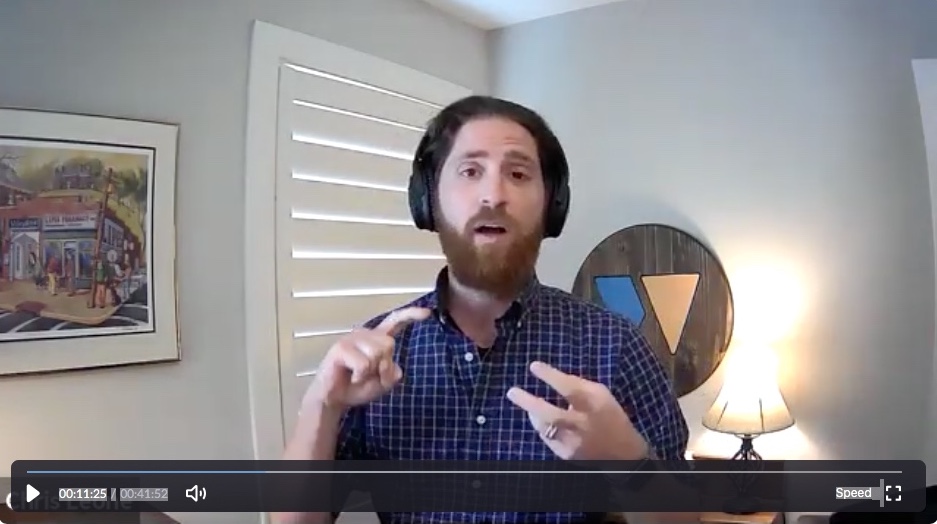
Chris Leone, CEO, WebStrategies
How was Chris Leone of WebStrategies feeling in the early stages of COVID-19? “I think maybe some of us kind of knew that this was not going to be a short-term thing,” he says. One of his biggest concerns for his digital marketing firm was figuring out how to approach customers when selling their services.
“It went from, ‘Um, yeah, sure – I’ll meet with you’ or ‘Now’s not a great time,’ to ‘How dare you try to call me right now?’ I mean, if you’re in sales or know people in sales, the responses we were getting were just vicious. The whole sales community is wondering, ‘How the heck do we behave right now through all of this?’”
Leone chose to focus on what he could control.
“We decided to create as much value as possible for our marketplace in the form of content and be as loud as we possibly could.” – Chris Leone, WebStrategies
“I can’t control what people are willing to give to me – their time, a meeting, a signed contract – but I can 100% control what I’m willing to give to them. So with that, our sales and marketing strategies shifted. We decided to create as much value as possible for our marketplace in the form of content and be as loud as we possibly could.”
Leone hired an additional marketing person, invested more in the content of his webinars, and tripled the amount of content on his website. Instead of asking for meetings, his salespeople offered free content – and the company has seen its first-meetings rate increase by 117% compared to last year.
What changed for good? Leone has learned to ask himself, “When the behavior of the marketplace changes quickly and dramatically, how can we adapt? So we remain focused on the things we can control instead of wishing for things to go back to how they were. We’re driving home the importance of being seen as a trusted authority in our space. [The pandemic] forced us to find new ways to do that, and we’re going to be able to carry that forward into the future.”
WHAT’S CHANGED FOR GOOD
Adaptability and focus on the controllable
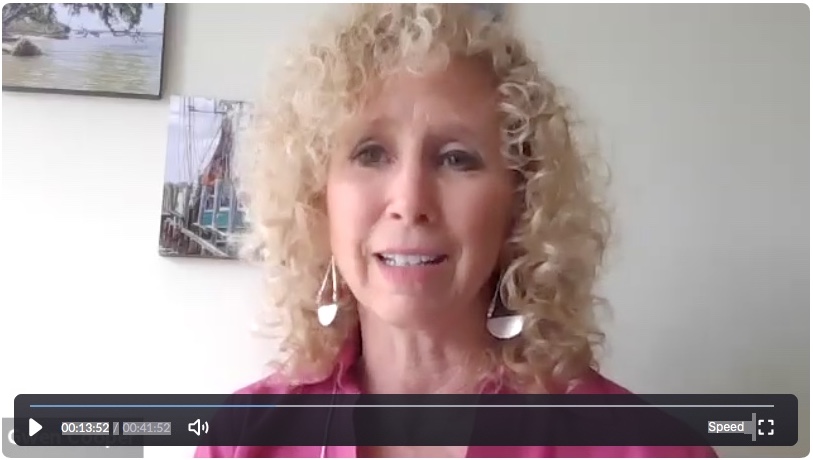
Gwen Cooper, CEO, Patient Services, Inc.
Gwen Cooper, CEO, Patient Services, Inc. (PSI), was hired as the company’s new CEO on June 1, smack in the middle of the pandemic. To say she’s had a challenging first few months on the job is an understatement.
“We are the oldest patient assistance program in the country headquartered in Virginia. Our nurses, doctors, outreach managers and government affairs teams were working around the clock to make sure all our patients had every opportunity to get the care they needed…in their homes.”
In her new role it was imperative that she quickly understood the “before COVID” work habits versus the “current state” work habit to determine how well it was working for her new team of 50. “[Moving staff remotely] gave us an opportunity to really look at our staffing needs, contracts and benefits to help us understand where we could streamline our expenses. Especially when it became clear we weren’t coming back anytime soon.“
“We’re not coming back to the office. We’re going to have a permanent flexible work schedule and work out what our remote working looks like.” – Gwen Cooper, Patient Services, Inc.
The great news is that productivity has actually increased, Cooper reports.
“What’s changing for us at PSI is that we’re not coming back to the office. We’re going to have a permanent flexible work schedule and work out what out remote working looks like,” she says. Making that work now includes keeping an eye on staff members’ “emotional bank accounts” since she knows they’re missing day-to-day interactions with each other.
WHAT’S CHANGED FOR GOOD
Operational efficiencies and a shift to a remote work model
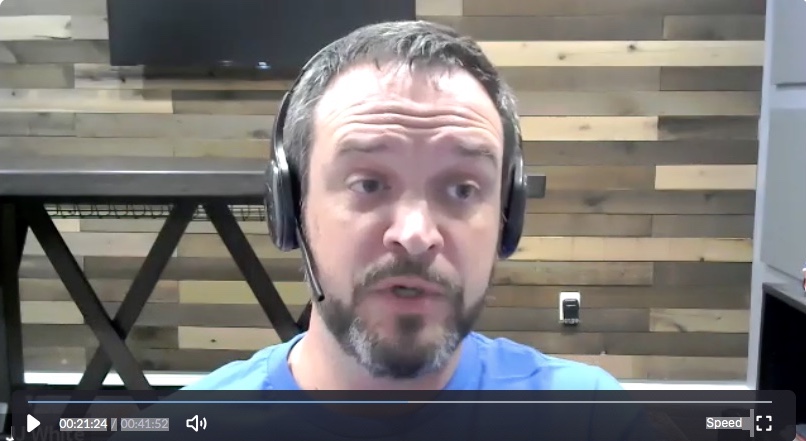
JJ White, CEO/Franchise Owner, Dale Carnegie
JJ White, Dale Carnegie CEO/Franchise Owner, is arguably the most affected by COVID-19 of our panel. “I’ve been a multi-unit franchise owner for Dale Carnegie Training for 20 years,” White explains. “Ninety-nine percent of what we’ve always done is bringing groups together in a room for transformational learning programs, bringing permanent behavior changes and soft skills, leadership, communication – things of that nature. When we started our week on March 16th, 99% of what we do ended.”
One percent of White’s business was not affected because Dale Carnegie was, at the time, one of the largest companies in the world delivering virtual instructor-led training. “So immediately, in one day, 1% of my business became 100% percent, but the sales weren’t there to compensate.”
In July, White – and the 108-year-old institution of Dale Carnegie – had to come to grips with the fact that it was time to completely reinvent how they went to market. Everything was evaluated, and nothing was so sacred that it couldn’t be changed.
“We took our core strengths and applied them in completely different ways,” says White. “We started to shift our entire operational model to a completely different deliverable. We helped existing clients acclimate to our new offer, and we found new clients and markets. The biggest change we made was to tear down the geographical boundaries of my regional sales team.”
“The biggest thing this crisis did for us was it solved so many constraints that we had in our business for years.” – JJ White, CEO/Franchise Owner, Dale Carnegie.
In a weird twist of fate, the pandemic could be seen as one of the best things that’s ever happened to his business. “The biggest thing that this crisis did for us was it solved so many constraints that we had in our business for years, especially being a global franchise network. We didn’t need a certain mass in a certain geographical area anymore. Everything is virtual and dispersed. It’s really enabled us to tear down walls that we should have torn down years ago, but didn’t have the courage to.”
White reports that sales are up, and he has confidence that his business will be OK.
CHANGED FOR GOOD
No more artificial boundaries or constraints
How has your business changed for good? Please share with us by leaving a comment.
Virginia Council of CEOs is a nonprofit dedicated to bringing CEOs of small and mid-sized businesses together to share experiences and to learn and grow with each other through peer roundtable groups and learning events. Learn more.
What Great Leaders Do Next: 6 Action Items

Leaders’ successes typically revolve around the ability to develop and implement brilliant visions. They help their staff move forward in their careers; they build their organizations; they make their communities better places. The blur of health and social trauma over the last five months (with no end in sight) gives leaders a very different challenge.
It’s hard to create a brilliant vision with this level of uncertainty; it’s hard to help people advance in their careers when a computer screen is the only connection; it’s hard to find the energy to move forward when the race is a marathon and the footing is muddy.
In addition to remaining positive and staying connected with your team, consider the following during these historically difficult times:
- Take care of yourself and your staff. If you’ve been working without a break, find a way to take one. Strong leaders say some of their best thoughts come during down-time. Needs are different for each person. To the extent that you can provide equitable flexibility, now is the time to do so. Also, be aware of the temporary COVID requirements for your HR policies.
- Refresh your strategic plan with an eye towards a 12 to 18-month window. There is no doubt that we can’t see far into the future, but having a cohesive plan will provide a sense of clarity, even if you’re planning for uncertainty. Focus on your mission and consider whether you need to adapt the strategy to react to any changes in the needs of the people you serve.
- Communicate with your Board, if you have one. If you are a nonprofit leader, your Board should be supporting you. Sometimes well-meaning Boards don’t know what to do. This is the time to over-communicate, be clear about your needs, and be sure to thank board members for the extra effort. Don’t have a board? Consider creating an advisory or “kitchen” cabinet board. These can be paid or unpaid advisors to your company that meet on a regular basis with you.
- Find a way to meet new people. New connections often bring opportunities and spark new ideas. Virtual networking is bubbling up. Take advantage of it.
- Keep an eye on the numbers, especially the projected cash flow. This is the time to stay on top of receivables and update your cash flow projections at least weekly. It’s also a good time to review your internal controls, especially if you have had to change procedures because of COVID. Know your key business drivers and metrics. We work with our clients to help them understand these key variables and create dashboards to get frequent readings on business performance.
- Build up someone else. That’s what the best leaders do!
 About the Author: Warren Whitney
About the Author: Warren Whitney
Warren Whitney is a results-oriented management consulting firm based in Richmond, Virginia who is dedicated to serving privately held and nonprofit organizations in four areas: Strategy, Finance/Accounting, HR, and IT.
Editors Note: Image and content provided by Warren Whitney. This post was edited to meet the style and content guidelines for this website. The original article can be found here. Warren Whitney is a Sponsor of Virginia Council of CEOs.
VA Council of CEOs Community Membership Gives CEOs a Peer Roundtable Experience at No Cost
Six months ago we could not have imagined the changes we are all facing now. If you own a small or mid-sized business in Virginia, VA Council of CEOs (VACEOs) is here for you.
Listen in as Scot McRoberts, Executive Director, Virginia Council of CEOs, talks about a no-cost peer roundtable membership offer that expires on September 30, 2020.
Says McRoberts, “Don’t face this challenging time alone. Join VA Council of CEOs. You have nothing to lose and so much to gain.
We’re a network of CEOs and other expert who come together to help one another. And membership for you is free right now. I encourage you to join us.
As a member of our community, you’ll have access to the Emerge Stronger Conference by Pat Lencioni and his team. He’s involved a number of other CEOs in that content that I think you’ll find really valuable. And you’ll have access to replays of other presentations we’ve held. The topics range from underlying legal risks that you’re dealing with, to managing your own mental health, to effectively selling online.
But most importantly, you’ll be given access to a network of peers in a virtual, confidential, roundtable setting. Peers who are ready to share information
and knowledge with you that can help you succeed.
Apply today. I want you to experience a peer roundtable as soon as possible.
Let’s move forward together.”
ABOUT THE COMMUNITY MEMBERSHIP OFFER
This no-risk, no-cost offer is extended to those CEO’s who would benefit most
from the Council’s programming and community. More specifically, those who manage a business in Richmond or Charlottesville Virginia with more than $1 million in revenue and employ five or more full-time equivalent employees (FTEs).
As a Community Roundtable Member you will have access to:
- VACEOs Flash Roundtable event(s),
- Exclusive VACEOs information-sharing sessions with local and national experts, including the Emerge Conference with Pat Lencioni and other thought leaders,
- A network of 200+ peers and sponsors who are committed to each others’ success.
Don’t delay, you’ve got nothing to lose. This offer expires September 30, 2020. Apply online for VA Council of CEOs membership.
Related post: Hear from Members (video testimonials)
Understanding Your Exit Strategy Options
All business owners will eventually exit their business, and I believe it is important for leaders to prepare well to exit well.
There are a number of tactics that owners can implement that will help them prepare well for an exit and achieve a sale-ready posture. The beauty of adopting a sale-ready approach is that it has two powerful benefits. First, it will make the eventual exit of your business easier, faster, and more lucrative, whenever and however that exit event may come. Business owners in a sale-ready position have invested the time in laying the groundwork that will enable a thoughtful, smooth transition into a sale or other capital-raising process. It will also enable you to respond quickly if you unexpectedly receive an attractive unsolicited offer from a potential buyer.
Second, the process of preparing your business for sale will make your business better, today. Business owners with a sale-ready mind-set think more strategically, have better insights into their companies, and make better decisions on where to take their business next. They, therefore, create a two-fold benefit: when the time comes to exit, they have a more valuable business and are better prepared to exit.
“M&A professionals often talk about two types of buyers: strategic and financial, yet there are subcategories of each that are meaningful to understand as you think about what the ideal buyer for your business might look like.” – Jonathan Brabrand
A critically important component of sale-readiness is for business owners to fully understand the various options available to them, both in terms of buyer categories and specific companies within each. Depending on the seller’s desired outcome, their options may include domestic and international strategic (corporate) buyers, private equity and other types of financial buyers, or both. It also may include groups that will take a minority stake in your business, in addition to those groups who look to acquire controlling majority positions in companies.
It is only with a full understanding of the available options that sellers can make informed decisions about which buyers to contact in the first place, and ultimately, with which buyer they choose to transact. Otherwise, they risk looking back on the sale of their business with regret at stones left unturned.
Sometimes my clients equate exiting their business with “selling out” to their primary competitor, and in most situations, this is not a pleasant thought. This aversion to turning their enterprise over to a despised competitor, including the feelings of the disloyalty to employees it would create, leads many business owners to turn their back on the whole M&A process. If you have certain competitors or other companies that you would never want to acquire your business, no worries—you don’t have to include them in the process at all.
The truth of the matter is different; there are many types of buyers from which to choose, each with its own unique characteristics. Let’s take a quick look at the primary buyer classifications to get a better sense of who they are and what they have to offer.
M&A professionals often talk about two types of buyers: strategic and financial, yet there are subcategories of each that are meaningful to understand as you think about what the ideal buyer for your business might look like.
Strategic Buyers
Corporate acquirers, whether they operate in competitive or complementary lines of business, are termed strategic buyers, because their acquisitions are focused on targets that provide a strategic fit with their overall growth strategy. Strategic buyers always have a “Make versus Buy” decision. Would it be quicker and/or more cost-effective to acquire a given business or to invest in creating the same capabilities from scratch in-house?
Strategic buyers can offer many attractive advantages to a seller. Chief among them is the ability for the selling owner to retire from the business after a short transition period, typically three to six months. In addition, for business owners that desire a full exit through a sale of 100 percent of their ownership, strategic buyers are likely the best alternative.
The benefits to your business of selling to a strategic buyer can also be attractive. Access to the buyer’s larger base of customers, more robust sales team, broader distribution capabilities, or a better sourcing network can all have a significant positive impact on your business’s future. The primary downsides to strategic buyers are the potential loss of the business’s independent identity and the possibility of cost-cutting, such as elimination of back-office functions that can be handled by the buyer’s current staff.
Strategic buyers can be further categorized by the location of their corporate headquarters. International strategic buyers often operate their US divisions independently with a hands-off approach, particularly if they don’t already have substantial operating businesses in the US. Domestic strategic buyers, on the other hand, are more likely to have higher levels of integration with their acquisition targets, yielding more efficient operations and cost savings that drive higher earnings to the bottom line.
Financial Buyers
Financial buyers are professional investors that acquire private companies with the goal of improving them before selling them several years later to realize a return on their investment. Hundreds of financial buyers are looking for small to medium-sized private businesses to acquire in the US, generally falling into one of three categories:
- Private Equity Groups
- Fundless Sponsors
- Family Offices
Private Equity Groups
Private equity groups are by far the largest cadre of financial buyers, both in terms of quantity and purchasing power. According to PitchBook, 563 new middle-market PE funds (funds of less than a billion dollars) were raised in the 2016–2018 timeframe, representing an aggregate of $148 billion of capital to invest in private companies.
The private equity model is simple and straightforward. A PE firm (the general partner, or GP) raises a pool of capital from investors (limited partners, or LPs) to then make equity investments in private companies. Private equity LPs often comprise insurance companies, pension funds, and college endowments that allocate a portion of their capital to private equity and other alternative investments, which offer higher returns with higher levels of risk.
Once a private equity fund raises the targeted amount of capital, the fund is closed to new LPs and the clock begins. PE funds typically have to invest all the committed capital in acquired businesses, called portfolio companies, within the first three to five years and then exit all the investments and fully return the capital to their investors within ten years. GPs earn an annual management fee, often 2 percent, of the total fund amount and then take a meaningful portion, often 20 percent, of the gains the fund generates. To increase the potential return on invested capital, PE firms will acquire businesses using a combination of their fund’s capital and bank debt that will be repaid by the portfolio company over time.
Because PE firms are professional investors and not business operators, they will control the Board of Directors, but rely completely on the existing management teams to run their portfolio companies. As a result, PE firms will motivate their management teams to increase the value of the business through options and the ability to own a minority portion of equity. The quality of management and their desire to remain in leadership positions are so important to most PE firms that they will not pursue acquisitions where management is not strong or wants to retire post-closing.
Fundless Sponsors
Fundless Sponsors are groups that pursue the same investment strategy as PE firms, but have not raised a fund of committed capital. Instead, they maintain a network of potential backers and raise the capital needed to make an acquisition on a deal-by-deal basis. For this reason, fundless sponsors are viewed as having more risk of a deal falling apart before closing than PE firms that control a fund of committed capital. That said, I have worked with a number of very successful fundless sponsors who were great partners to their portfolio companies.
Family Offices
Family offices make investments in private businesses like a private equity group, but their capital comes from one or more high-net-worth individuals or families. As such, they are considered more patient capital since they don’t have time pressure to sell their investments and return capital to LPs. In fact, many family offices take a long-term approach to their portfolio companies or may even plan to hold their businesses indefinitely. Family offices also typically use less bank debt in their acquisitions, which many business owners find more comforting.
PE-Backed Strategic Buyers
Once a private equity firm has made an investment in a stand-alone business, or platform company, they often seek to grow that platform by making smaller, add-on acquisitions. This PE-backed platform company thus becomes a hybrid category of buyer, blending the characteristics of both a strategic and financial buyer. It is common for platform companies to be particularly aggressive in pursuing add-on acquisitions in the first twelve to twenty-four months of PE ownership, when sufficient time exists to reap the rewards of the add-on growth strategy before the PE firm needs to sell the overall platform.
When you have a full understanding of the range of strategic and financial buyers that exist and what each can bring to the table in a potential transaction, you can make the best choice of partner for you and your business. For some sellers, a strategic buyer offers the ideal option for a successful exit. For others with a longer-term horizon and appetite to continue leading their company forward, private equity is the perfect partner.
Jonathan Brabrand is a Managing Director at Transact Capital Partners, a boutique M&A advisory firm and long-time corporate sponsor and supporter of the Virginia Council of CEOs.
Editor’s Note: This article was adopted from Jonathan Brabrand’s new book, The $100 Million Exit: Your Roadmap to the Ultimate Payday. If you would like to connect with Jonathan, you can reach him via email at jonathan@transactcapital.com or connect with him on LinkedIn.
COVID-19 Update: Treatments, Vaccines, Herd Immunity, Testing +
We all have questions about COVID and how to keep ourselves, our family, and our colleagues healthy and safe. Today, we find that we are providing custom advice on everything from testing and temperature checks, to what to do if you spike a fever in the middle of the night, to what are the most important things personally right now to be as healthy as possible. We’ve even gone on virtual tours of offices, providing feedback on how to improve the safety of the environment.
It’s a new frontier for healthcare providers, no doubt!
Are you in search some reliable, up-to-date medical information about the COVID-19 virus? Each week, Dr. Steven Bishop, Director of Wellness at PartnerMD, provides a COVID-19 update on Facebook Live, explaining in easy-to-understand terms the latest information related to the virus.
For example, on July 22 Dr. Bishop:
- discussed promising vaccines from Phizer, one from Moderna, and one from AstraZeneca
- shared his thoughts on why there is a focus on metabolic health
- discussed testing in Virginia
- answered the question, “Does the increase in positives indicate immunity sharing?” and more.
Listen in on that video session here:
DR. BISHOP TO PRESENT TO VACEOs MEMBERS ON AUGUST 6 AT 2:00 PM
Dr. Bishop regularly advises clients and their leadership teams on COVID and how to maximize their resilience against the virus – both as a company and as an individual when it comes to your personal health. He’ll be giving a virtual presentation to the VACEOs community on August 6 at 2:00 PM. Don’t miss this opportunity to ask him direct questions. Here’s a link to register. (VACEOs Members and Sponsors only.)
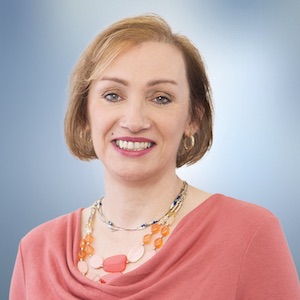 ABOUT THE AUTHOR
ABOUT THE AUTHOR
Janet Kiss is a Membership and Corporate Sales Associate at PartnerMD and is available for one-on-one and/or roundtable conversations for VA Council of CEO Members.
Editors Note: PartnerMD is a Sponsor of Virginia Council of CEOs.

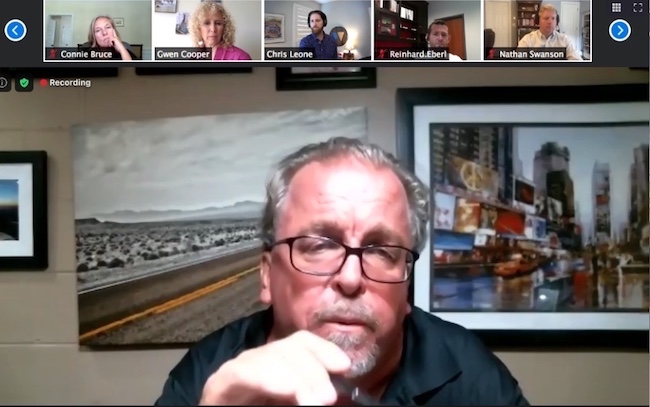 Mark Smith, Owner, Midas of Richmond
Mark Smith, Owner, Midas of Richmond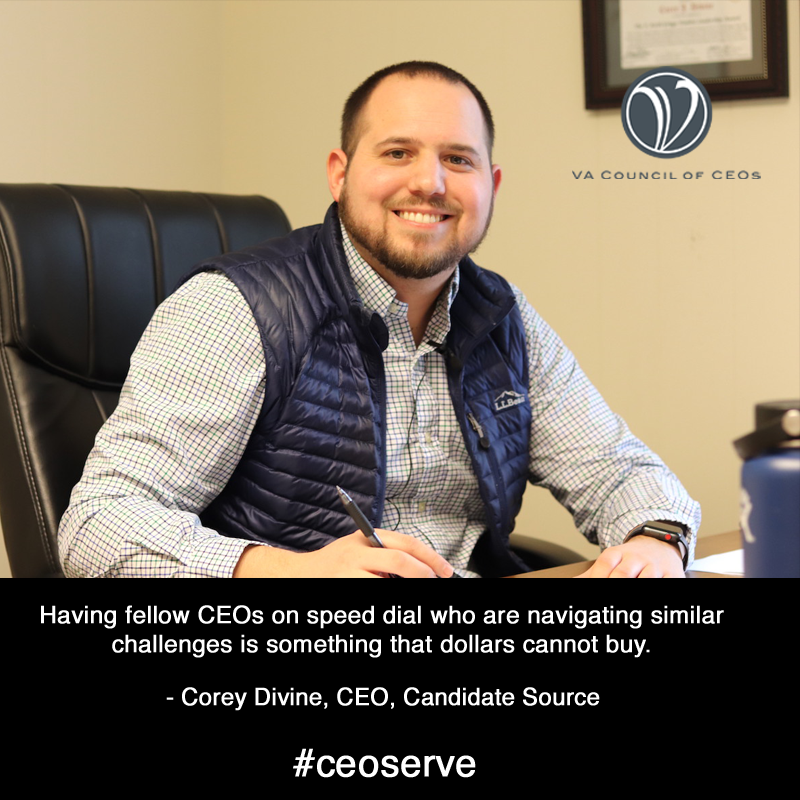



Recent Comments